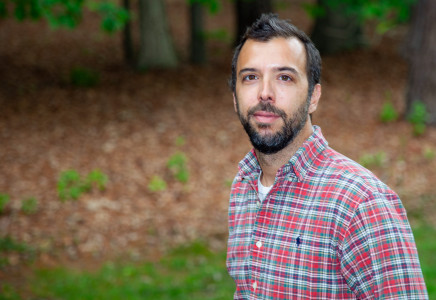Health physicist chairs inaugural DOE-wide artificial intelligence learning committee
Deputy Radiation Control Department Manager Adam Stavola knows how to learn. The health physicist at the U.S. Department of Energy’s Thomas Jefferson National Accelerator Facility has spent all but eight years of his life in a formal academic program. So, when the U.S. Department of Energy was putting together an inter-lab task force to study and implement new artificial intelligence (AI) technologies, Stavola eagerly volunteered to be involved.
“I’m pursuing a Ph.D. in AI, so this new taskforce was very interesting to me,” he said.
The group formed in December 2022 and named Stavola as its chair.
“AI has advanced so much that leaders within the DOE determined that we need to learn about ways we can use AI in labs across the country,” Stavola explained. “The goal is for all the different laboratories within the DOE to pool together and try to solve specific problems using AI to help.”
Learning on the job
For the first project, the AI taskforce is focused on improving operational processes—due largely to the relatively low risk of applying AI in these situations.
“By choosing to incorporate AI with an operations project, our learning doesn’t have a direct safety impact,” Stavola said. “We’ve picked something for our first project that has a low potential for causing problems. If it works, great. If it doesn’t, we haven’t hurt anything.”
Stavola also notes that this project has the further benefit of opening lines of communication between loosely connected operations counterparts in labs across the country.
“Researchers across labs work together a lot, but operations teams don’t necessarily collaborate among the labs,” said Stavola. “We want to see how we can use AI to make operations more efficient by using data from all labs. Maybe AI can help us improve on best practices. Maybe it will enable us to make better predictions.”
Stavola also recognizes that AI may have a significant impact on efficiently processing data gleaned from laboratory operations.
“We are also trying to use AI to take care of things that would take humans too long,” he continued. “One of the things we do is look at our lessons learned. AI will mine the incredible amount of data we have about what has happened in the past in order to make predictions. So, if we are experiencing something, AI can notify us if we’ve previously been in a similar situation, and it can tell us what to expect.”
Stavola notes that AI is not being developed to work completely autonomously and without feedback from the human team.
“An example of how we might use AI, but not trust it fully, is: if AI detects potential for rain, we might grab an umbrella before we leave the house,” he explained. “Of course, we still check for rain when we step outside and before we open the umbrella.”
AI as more than a task force project
While Stavola is enthusiastic about his work with AI, he admits that his role on the AI task force represents only a small percentage of his responsibilities at the lab.
“My main job—and really what takes up most of my day and what I’ve been doing since 2006—is that I’m a board-certified health physicist,” Stavola shares. “As a health physicist for the lab, my work is all about radiation protection for laboratory staff, the environment and the general public.”
Stavola has a master’s degree in electrical and electronics engineering from Old Dominion University (ODU) and a master’s degree from Christopher Newport University in applied physics and computer science. Currently, he is a Ph.D. candidate at ODU researching how AI can use meteorological data to predict relative uranium concentrations in soil.
Like the AI learning taking place at the lab, Stavola says he is invested in his own unending process of intentional learning, which he views as his biggest hobby.
“You get interested in all these things and you go down all these different pathways,” he laughed. “Some would say I’ve been a glutton for punishment; I’ve been in school my entire adult life. I’m constantly trying to get better at what I’m doing. It’s about pushing myself. And, yes, learning is my biggest hobby. Otherwise, this much school doesn’t make any sense!”
“I’ve learned that the more you learn, the more you realize you don’t know,” he said, recognizing that it’s a bit cliché. “The more you learn, the more you want to learn. I am constantly discovering things that I don’t know about, but I want to know about. And you learn about more niche subjects and say, ‘Oh this is new. Lemme go dig into this for a little while.’ You always want to push it a little more. I think most people are like that.”
Further Reading:
Radiation Control Department
Jefferson Lab Accelerator Operations
By Carrie Rogers


